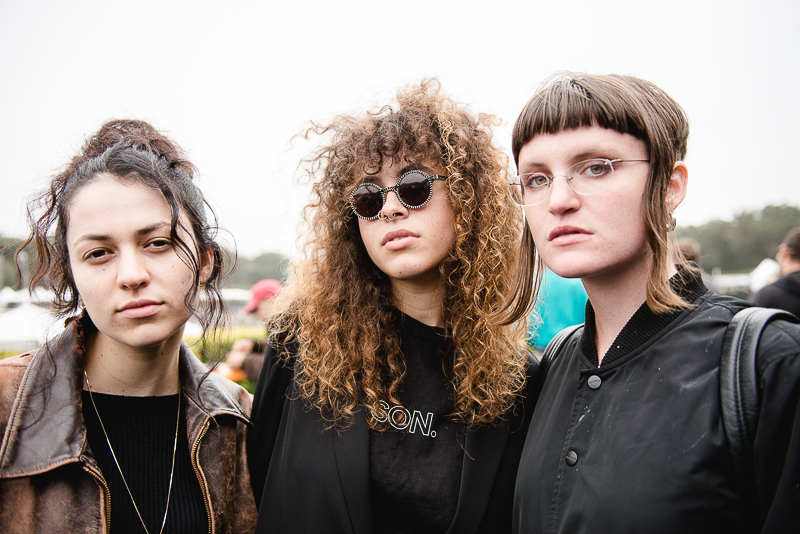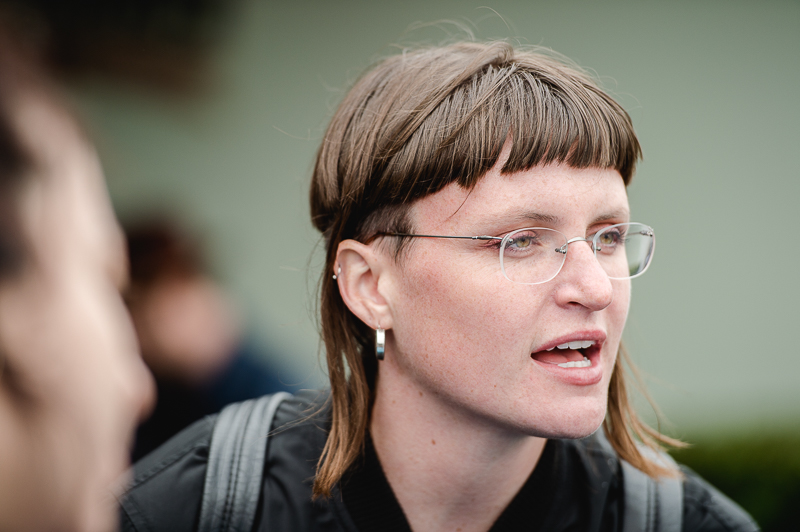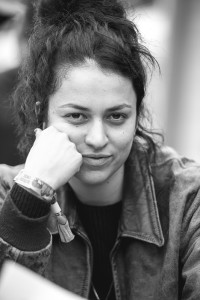INTERVIEW: MUNA embraces the soapbox and the ‘Loudspeaker’

Muna photographed at Golden Gate Park at Outside Lands Music Festival in San Francisco on Aug, 12, 2017. Alessio Neri/STAFF.
At first, the three musicians in MUNA were not sure whether they could a role as important as role models and inspirations to the queer community. These, days, however, not only have vocalist Katie Gavin and guitarists Josette Maskin and Naomi McPherson accepted the role, but they cherish it above their success in music. They’ll take the soapbox over fame and riches any day.
MUNA
8 p.m., Wednesday, Oct. 18
The Independent
Tickets: $20.
“I think any time that you’re doing something that is affecting others, career and financial success will hopefully follow,” said Maskin, whose moody, soul-baring band performs at the Independent on Oct. 18. “I don’t feel we do it for that reason. We do it because we love making music, and we love being with each other. We love to meet people and see that what we think about the world, they kind of think about the world.”
The music industry doesn’t offer many spokespeople to the LGBT community. PWR BTM was hugely influential until the band imploded after accusations surfaced that one of them was guilty of the very thing the duo stood against. Many fans were devastated and looked elsewhere.
“I guess people do want to be spokespeople when they, like, run for senate, congress and stuff like that,” McPherson said. “It’s hard, as a band, to see yourself as a spokesperson for a cause, especially if you don’t have an incredibly detailed background in public policy or lawmaking. But I think we know enough to try and say the right thing when [it’s] appropriate.”
More than anything, Gavin said, the members of MUNA want to hold themselves accountable to the ideal of giving people what they need, rather than what they think they want. They don’t want to do it for show, either. They want what they say and do to serve as substantive purpose rather than another of many distractions.
“We’re responsible for people, and they’re choosing us,” Gavin said. “How can we continue to be of service other than to think we know all the answers? We [want to] continue digging stuff up when people try to put specific labels on us.”
Gavin used her voice to make arguably the band’s biggest statement while performing standout track “I Know a Place,” in front of a national audience on Jimmy Kimmel Live! in February. During the song’s already stellar bridge, she reworded the lyrics to make for an elegant protest: “Even if our skin or our gods look different/ I believe all human life is significant/ I throw my arms open wide in resistance/ He’s not my leader even if he’s my president.” It was a spine-tingling moment that the band has since repeated at other shows.
The decision to go off-script was made entirely by Gavin, McPherson said.
“Katie carried it with such grace and was so confident going in,” she said. “‘These are the lines. This is what I’m going to say. I’m going to say it during the break, and that’s what we’re going to do.’ That was powerful to watch [later].”

Muna photographed at Golden Gate Park at Outside Lands Music Festival in San Francisco on Aug, 12, 2017.
It was a bold move by a band that had just released its debut album. About U is a collection of raw emotion about love, sex, empowerment and fragility. It tackles gender identity without ever using a gender-based pronoun. All three members identify as queer.
While the songs are not rock and roll, they share some of the genre’s hallmarks: Protest, subversiveness and raw energy. MUNA refers to its style as “dark pop,” but there are glimmers of light and hope throughout.
Take the anthemic single, “Loudspeaker.” Gavin originally wrote the song about sexual assault, but many listeners pulled on the song’s strands of recovery and standing up against evils. Once the song was released, it ceased being the band’s and became what it needed to become to different people, Maskin said.
“Crying on the Bathroom Floor” is also about facing trauma, Gavin said, specifically, trauma bonding, what’s commonly known as Stockholm Syndrome. She was obsessing over the psychological and chemical reactions in victims of the abuse at the time she wrote it.
“You can confuse [pain] with feelings of love,” Gavin said. “I was interested in the concept of being aware that you’re being mistreated. There’s a line in the song: ‘I guess that I got rewired, because you’re cold as ice but it feels like fire.’ Then the chorus is like I’m literally crying on the bathroom floor; that’s the rock bottom moment. You can look in the mirror and say, ‘I know this isn’t right.’ And know how to start asking different questions.”

Muna photographed at Golden Gate Park at Outside Lands Music Festival in San Francisco on Aug, 12, 2017.
The band originally wrote “I Know a Place” about the legalization of gay marriage. The song took up a new meaning for millions following the deadly 2016 terrorist attack on a gay nightclub in Orlando.
Gavin, the primary lyricist, is also an avid journal keeper. In her journals she writes about herself, the people around her and ideas for song lyrics. Sometimes she will write essays about the meanings of the songs. In college, after she, Maskin and McPherson started MUNA, she was the band’s first publicist, writing press releases.
She has loved writing since she was young but turned to songwriting after a teacher encouraged her to look at fiction and poetry over academic pieces. With her words, she searches for deeper meaning and rationalization, she said.
Finding deeper meanings and connections is one of MUNA’s collective goals. As inspiration, McPherson points to, of all things, a Tweet by Jack Antonoff.
“[He] said … if you keep putting your best foot forward and working hard, and what you’re doing is substantive, people will follow,” she said. “We’re enjoying playing to big crowds, but if you’re in a tiny room and everyone is paying attention … that sometimes can mean more than being in front of 80,000 people.”

Muna photographed at Golden Gate Park at Outside Lands Music Festival in San Francisco on Aug, 12, 2017.
Connecting with more and more people, and creating authentic art is Gavin’s goal to take the band to the next stage. She’s pleased about MUNA’s momentum because it’s not based on hype, or “based on almost nothing that you actually did.” The momentum she cares about is the kind that involves good ideas, creativity, hard work and the band members’ connections to each other.
Maskin takes connections one step further and credits the band’s swift growth for being able to connect with individuals while they are on stage.
“I want to look at you as a person; but I want to be able to do that with everyone,” Maskin said. “It’s like with anything. You want to focus on the individual. That’s the humanity in it.”
***
Follow Roman Gokhman at Twitter.com/RomiTheWriter. Follow photographer Alessio Neri at Instagram.com/windowofcolor and Windowofcolor.com.
